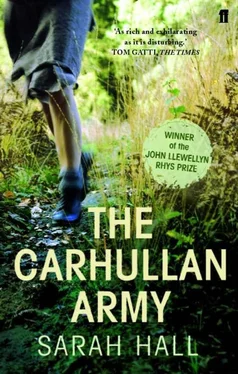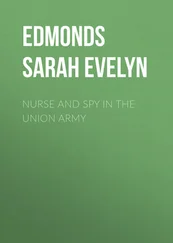Sarah Hall - The Carhullan Army
Здесь есть возможность читать онлайн «Sarah Hall - The Carhullan Army» весь текст электронной книги совершенно бесплатно (целиком полную версию без сокращений). В некоторых случаях можно слушать аудио, скачать через торрент в формате fb2 и присутствует краткое содержание. Год выпуска: 2008, Издательство: Faber and Faber, Жанр: Современная проза, на английском языке. Описание произведения, (предисловие) а так же отзывы посетителей доступны на портале библиотеки ЛибКат.
- Название:The Carhullan Army
- Автор:
- Издательство:Faber and Faber
- Жанр:
- Год:2008
- ISBN:нет данных
- Рейтинг книги:4 / 5. Голосов: 1
-
Избранное:Добавить в избранное
- Отзывы:
-
Ваша оценка:
- 80
- 1
- 2
- 3
- 4
- 5
The Carhullan Army: краткое содержание, описание и аннотация
Предлагаем к чтению аннотацию, описание, краткое содержание или предисловие (зависит от того, что написал сам автор книги «The Carhullan Army»). Если вы не нашли необходимую информацию о книге — напишите в комментариях, мы постараемся отыскать её.
The Carhullan Army — читать онлайн бесплатно полную книгу (весь текст) целиком
Ниже представлен текст книги, разбитый по страницам. Система сохранения места последней прочитанной страницы, позволяет с удобством читать онлайн бесплатно книгу «The Carhullan Army», без необходимости каждый раз заново искать на чём Вы остановились. Поставьте закладку, и сможете в любой момент перейти на страницу, на которой закончили чтение.
Интервал:
Закладка:
Some residents in the old sandstone quarters had made the best of things, abandoning privacy, opening up the house rooms like one big happy family. All our doors were kept shut. I barely knew the names of the other residents. They were so close by, so familiar, but they were strangers.
I knew it was a stupid thought to have had, spontaneous camaraderie with this woman I did not know, and I abandoned it almost immediately. I told myself I was just feeling it because I was conscious of where I was heading soon, and I had ideas in my head about it all. But I had to remain discreet. Nobody else was to know anything.
The woman looked at me again with an annoyed expression. ‘Oh, it’s all right. I’m just in a bad mood,’ she said. ‘Turns out I’ve got TB. That new bloody strain. Aye, so. I’m away into quarantine probably and the kids will have to contend with their father. They say there are some drugs that will help. But I know it’s not true. Besides, I’ve got no money. Who the hell has? Oh, but they’ve given me this — for all the good it’ll do!’ She reached into her coat pocket, took out a faith card, and tossed it to the ground. She rolled her eyes. ‘These bloody Victorian houses. I might as well put on a corset, sleep in the coal shed, and have done with it, right?’
She took a draw on the cigarette. I told her I was sorry, said goodnight, and went inside to the bedroom. I put the gun in the cupboard and made sure the barrel was fully covered by my overcoat. The cartridge boxes I placed under the bed next to a stack of magazines. It was too tiny an area for hiding anything but I had little choice.
For the rest of the week, I was filled with paranoia. Every time Andrew got in and out of the covers, I imagined him kicking the shells and scattering the metal casings across the room. There would be no hope of denying any knowledge of them. Our possessions were few and all were accounted for. In the nights that had followed I seemed to wake with a start every hour, reaching down to touch them, making sure they were properly stowed, praying he would not find them.
But now I was safely away, beyond exposure and explanation. I was alone. Here in the empty Lakeland village I couldn’t have explained to anyone exactly how secure I felt, even if there had been someone around to listen to me. The village reverberated with silence, with human absence. There was not a soul to be found and I liked it. It had been so long since I had felt that. Even on the Beacon Hill above Rith I could see people moving in the streets and I knew they were close by. Here I was breathing air that no one else’s breath competed for. I was no longer complicit in a wrecked and regulated existence. I was not its sterile subject.
Standing opposite the gutted church, in the wet deserted roadway, something unassailable crept over me. I felt the arrival of a new calmness, an assurance of my own company. The only noises, other than the movement of wind through the trees and the trickles of water, were the animal sounds of my tongue moving in my mouth, and my boots grating on the ground as I adjusted my stance. I was aware of my own warm predominance in the environment, my inhabited skin, my being. I suddenly felt myself again, a self I had not been for so long. I remembered how I had experienced the same feeling in this place when I was young, when I had been here walking, before the restrictions.
The hikes had always been long and steep. ‘Get on, lass, just over that brow,’ my father would call back when I lagged behind, aching and winded. ‘You’ll live,’ he would shout back to me. ‘You’ll live through it. It’ll not kill you.’ It was here that I had first understood I was stable on my feet, capable of direction and distance and stamina. It was here in the blue fells that I first knew I was strong, and that I had it in me to be stronger.
Now, once again, I was in that landscape, where human beings had always journeyed to feel less and more significant than they were. Where the mountains stupefied and emboldened them, bringing them high and to the edge of what they thought themselves capable. As I stood and looked in the direction of the summits I felt properly dressed in my own muscles, and ballasted by my sense of physicality, as if I belonged outside, away from the crowding, the metered artificial lighting, the ethics of a lost society.
Ahead of me the hills were disappearing under heavy cloud, another front of rain was moving in, obscuring the horizon. I took a deep breath, picked up my rucksack and put it on. Inside its material the butt of the gun rested firmly against my back. I didn’t know how good a shot I might be — it had been years since I aimed through the sights — or even if the gun still worked. But I was pleased to have it, pleased that I could offer it to those at the farm.
I walked through the settlement and began upwards towards the fells. On the howse there were delicate purple harebells growing in the grass between limestone outcrops. It was too late in the season for them, but at that moment they were the loveliest thing I had seen. As the clouds drifted down, thunder rolled again, sounding loud in the hollows of the mountains, and after a moment or two, rain began to run down the soft cambers of the sky. I stopped, put the bag down, and stripped off to the waist. I put the damp bundle of clothing into the top of the rucksack, tied its neck, shouldered it, and walked on. The clean October air passed over my skin. Rain snaked down my shoulders and arms, dripping off my breasts. I knew I must look peculiar. But there was no one around to see me. The driver of the van was long gone, back to his lonely life at the draw-off tower. The closest human beings to me now were the women of Carhullan. By the end of the day I would be with them. I would be one of them.
FILE TWO: COMPLETE RECOVERY
I had first heard about the farm at Carhullan when I was seventeen. Even then it had notoriety, a bad reputation. Its lamb was being sold in Rith, its vegetables and honey, and char when the tarn on its estate held them. The women living there traded every month in the border markets, with organic labels and low prices. When they arrived in town conversation about them picked up, the way it used to when the travellers came for the horse-driving trials.
They were a strange group, slightly exotic, slightly disliked. I could remember seeing them in Rith’s market stalls, setting up their tables, staring down the hostile looks of other farmers. They were odd-looking. Their dress was different, unconventional; often they wore matching yellow tunics that tied at the back and came to the knee. Seeing their attire, people thought at first they must be part of a new faith, some modern agrarian strain, though they did not proselytise.
They were always friendly towards other women, joking with them over the wicker trays of radishes and cucumbers, giving out discounts and free butter. With the men they acted cooler; they were offhand. People commented that they must be doing all right for themselves up there on the fell, if they were solvent and could still afford to drive a Land Rover all that way into town each week. When we went shopping my father told me not to buy anything from them. ‘Give that lot a wide berth,’ he would say, nodding towards the group. ‘It’s probably wacky butter they’re flogging.’ If I lingered too long near their patch he would hurry me back to the car, saying we were late for something. But if he wasn’t around, or if I had come with friends, I would go and buy homemade ice cream from the women. ‘Thank you, Sister,’ they always said when I handed them the money.
There had been a skirmish in the market once, not a fight exactly but a physical exchange of sorts. My father and I had only seen the end of it, as it broke up. There was the sound of scraping and a soft thump, and when I looked over I saw that three of the yellow-shirted women were standing over a young man. There were cabbages rolling on the ground around him. He was cursing them, calling them dykes. The expression on his face was one of shock and outrage. But their faces were utterly calm.
Читать дальшеИнтервал:
Закладка:
Похожие книги на «The Carhullan Army»
Представляем Вашему вниманию похожие книги на «The Carhullan Army» списком для выбора. Мы отобрали схожую по названию и смыслу литературу в надежде предоставить читателям больше вариантов отыскать новые, интересные, ещё непрочитанные произведения.
Обсуждение, отзывы о книге «The Carhullan Army» и просто собственные мнения читателей. Оставьте ваши комментарии, напишите, что Вы думаете о произведении, его смысле или главных героях. Укажите что конкретно понравилось, а что нет, и почему Вы так считаете.












